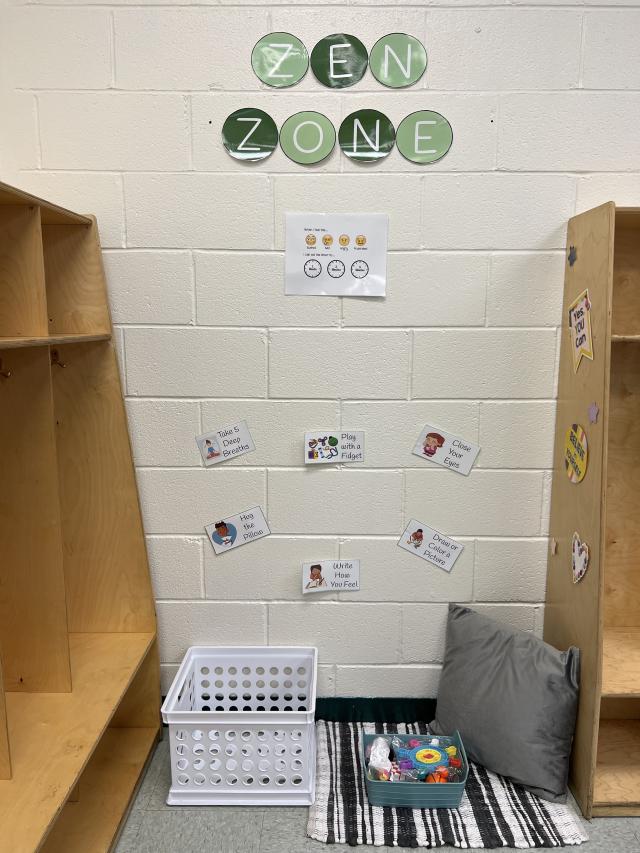DOE-Funded Project at Kean Instills Restorative Justice in Schools

One school starts each day with a morning message of kindness. Other schools are creating “restorative spaces” where students can go to reset and avoid conflicts. Still others are forming parent groups, similar to PTAs, to help implement restorative justice practices.
Fourteen schools across New Jersey are introducing new models of student discipline as part of Kean University’s pilot project on restorative justice. It launched in Spring 2021 with a grant from the state Department of Education (DOE) to support building a more inclusive culture in K-12 schools. The grant is administered by the Holocaust Resource Center at Kean.
Working with the New Jersey schools, Kean’s grant team provides training and resources in restorative justice, a practice that seeks to reduce the reliance on certain forms of student discipline like suspension. Techniques like student court, mediation and restorative circles, in which participants build trust by facing each other in a circle and talking things out, are introduced to support community and equity.
“At the core of Restorative Justice is relationship building between teachers, administration in schools, students and families,” said Susan Maiorano, ’20, a research assistant working on the project. “It cannot happen without that foundation.”
Restorative justice has roots in racial and social justice and findings that school discipline is often inequitably applied. According to DOE data shared by the Kean team, New Jersey students lost 168,509 school days to out-of-school suspensions in the 2018-2019 school year, with the suspension rate for Black students three times that of white students.
“The overarching goal is to keep students in class,” said Zoey Guarino, the project’s assistant director. “We’re doing really important work.”
The team links school districts with experts in restorative justice. They also created a Restorative Justice in Education website; conduct school visits; reach out to community partners; and gather data for a series of case studies on different schools.
The DOE grant provides up to $500,000 per year, and the team plans to apply for the third year of funding next spring.
Graduate Assistant Alexandra Sep ’21 of Clark, who is pursuing her school psychology professional diploma at Kean, created the digital collection, with resources such as documents, videos and links to recorded webinars.
Sep hopes to become an early childhood school psychologist. She said the work fits her future goals.
“Seeing educators’ positive reactions to training has been extremely gratifying,” Sep said. “As a team, we recognize restorative justice is not a destination but a journey. We thoroughly enjoy supporting all educators on their journeys.”
Jacquelyn Van Orden is the principal of Glen Meadow Middle School in Vernon, which implemented a Morning Message of Kindness, a reset room for students, and an inspire kindness campaign with the hashtag #inspirekindness, as well as t-shirts and bracelets.
Van Orden said the new practices have changed the outlook of educators at the school.
“Faculty and staff report there is a newfound feeling of hope when it comes to changing the disciplinary practices. By building relationships, we are well on our way,” she said.
Steve DiMatteo, principal and director of special education for Atlantic Community Charter School in Galloway, said his school began a morning “calm classroom” mindfulness announcement followed by homeroom restorative circles. Each classroom created a respect agreement; the school revised its discipline code of conduct; and a student support center gives students a quiet place to reset.
The K-8 school has seen “positive change in school culture” and a “dramatic” decline in discipline referrals and suspensions, from 29 suspensions in September-October 2021, to eight suspensions during the same time this year, DiMatteo said.
“Feedback from staff and students has been nothing but positive,” he said.
Adara Goldberg, Ph.D., director of the Holocaust Resource Center, said the techniques do not completely replace existing disciplinary methods.
“An overarching goal of this project is to promote student learning and school safety,” she said. “Transitioning to restorative practices will not do away with the need for consequences after a student violates the code of conduct. Instead, it will help to foster meaningful communities within classrooms so these violations occur less often.”